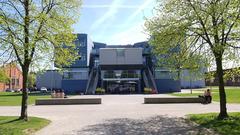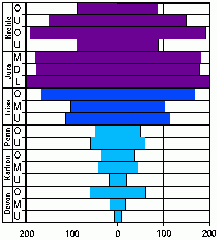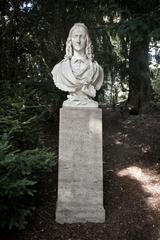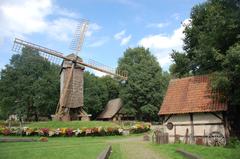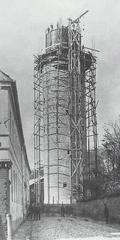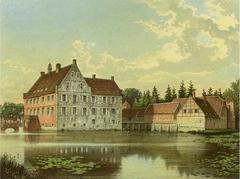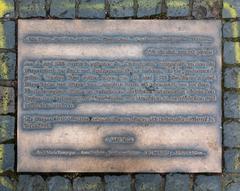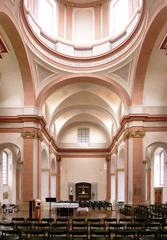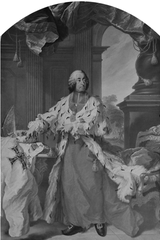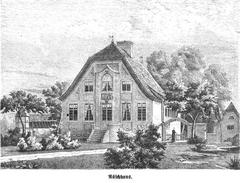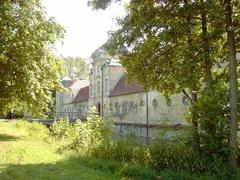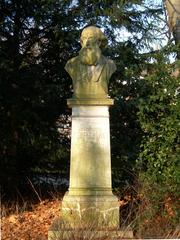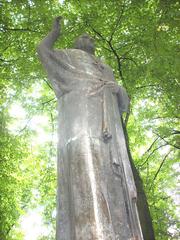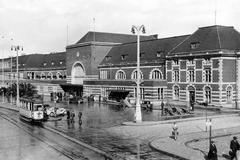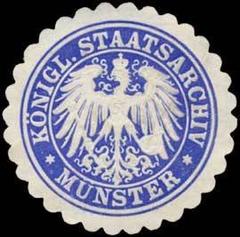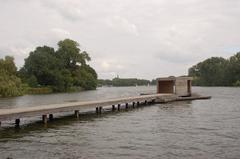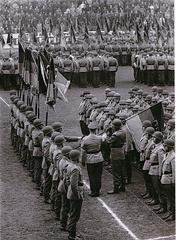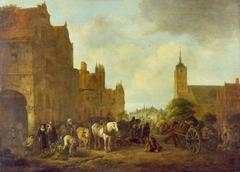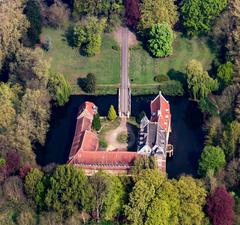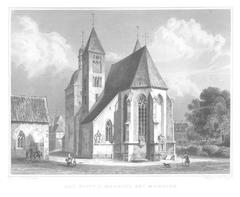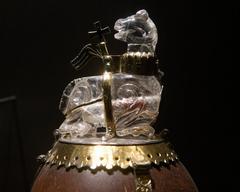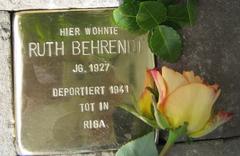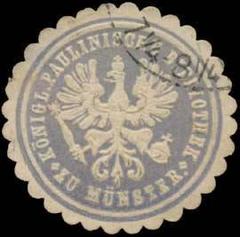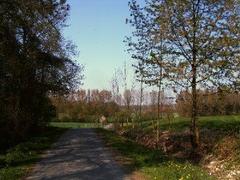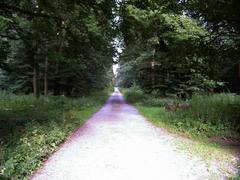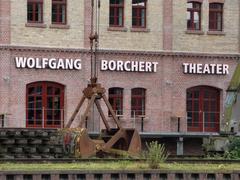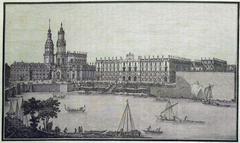Theater Münster: Visiting Hours, Tickets, and Guide to Historical Sites in Münster, Germany
Date: 14/06/2025
Introduction
Theater Münster stands as a modernist landmark and a central pillar of Münster, Germany’s cultural life. Established in 1956 as the first new theatre built in Germany after World War II, it harmoniously integrates the city’s rich history with innovative architectural design. The theater is celebrated for its diverse programming, vibrant community engagement, and commitment to accessibility, making it a must-visit for locals and tourists alike. This comprehensive guide details everything you need to know about visiting Theater Münster: from practical information on tickets and accessibility, to its architectural highlights and proximity to Münster’s renowned historical sites.
For the latest updates on performances, ticketing, and accessibility, visit the official Theater Münster website. Regional tourism resources, such as Münsterland Tourismus, offer further travel tips and city highlights.
Table of Contents
- Introduction
- Visiting Theater Münster: Practical Information
- Theater Münster: Architecture and Cultural Significance
- Annual Programming and Community Involvement
- Visitor Facilities and Amenities
- Exploring Münster’s Historic Sites
- Frequently Asked Questions (FAQ)
- Conclusion and Travel Tips
- References and Further Reading
Visiting Theater Münster: Practical Information
Visiting Hours and Ticket Purchase
- Box Office Hours:
- Monday (telephone only): until 17:00
- Tuesday to Friday: 10:00–18:00
- Saturday: 10:00–14:00
- Performance Times:
- Generally, performances begin between 7:00 PM and 8:00 PM; the theater opens one hour prior to showtime.
- Ticket Purchase:
- Tickets can be purchased at the box office, by phone (+49 251 59 09-100), via email ([email protected]), or online through the official Theater Münster website.
- Tickets range from €10 (concessions) to €40 (premium seats), with discounts for students, seniors, and groups.
- Early booking is recommended, especially for premieres and popular events.
Accessibility
Theater Münster is dedicated to inclusive experiences for all visitors:
- Physical Accessibility: Step-free access, ramps, elevators, accessible restrooms, and designated wheelchair seating.
- Assistive Services: Audio description, sign language interpretation, and assistive listening devices for select performances (Accessibility Information).
- Companion Policy: Complimentary or discounted tickets for companions/carers with valid proof.
- Communication Support: High-contrast signage, large-print materials, and multilingual assistance at the information desk.
Advance notice is recommended for visitors requiring special accommodations.
Getting There and Parking
- Address: Neubrückenstraße 63, 48143 Münster, Germany
- Public Transport:
- Münster Hauptbahnhof (main train station) is approximately 1 km away (10–15 min walk or short bus/taxi ride).
- Several bus lines serve stops near the theater.
- Parking:
- Multiple city center garages; parking spaces fill quickly during major events, so public transport or cycling is advised.
- Bicycle parking is available, reflecting Münster’s bike-friendly infrastructure.
Guided Tours and Special Events
- Guided Tours:
- Bookable via the website or box office; available in German and upon request in English.
- Tours cover the theater’s architecture, history, and backstage areas, with adaptations for accessibility needs.
- Special Events:
- The annual calendar includes premieres, festivals, and seasonal events like Christmas market concerts.
- For the latest event schedule, visit the official program page.
Theater Münster: Architecture and Cultural Significance
Historical Development and Post-War Context
Opened in 1956, Theater Münster symbolized the city’s cultural rebirth after World War II. It was the first new theater building in postwar Germany, reflecting both resilience and a commitment to modern art and architecture (Britannica, Wikipedia).
Architectural Highlights
- Modernist Design:
- Architects Harald Deilmann, Max von Hausen, Ortwin Rave, and Werner Ruhnau embraced modernist principles of clarity, openness, and functionalism.
- Integration of History:
- Remnants of the destroyed municipal theater and music school are incorporated into the new building’s courtyard, blending past and present.
- Signature Features:
- Nicknamed “the thunderbolt of theatre architecture,” the building’s bold forms and glass facades create a transparent, inviting atmosphere (Muensterland.com).
- Venues:
- Großes Haus: Main auditorium for 955 guests, designed for optimal acoustics and sightlines (Münster Inside).
- Kleines Haus: 280-seat venue for chamber plays/experimental works.
- U2: Black box for avant-garde and youth theater.
- Foyers:
- Expansive, well-lit public spaces double as social and exhibition areas.
Renovations continue to enhance accessibility and sustainability, including energy-efficient lighting and climate control.
Regional and Urban Impact
The theater’s modernist design contrasts and harmonizes with Münster’s medieval and baroque surroundings, reinforcing the city’s reputation as a “Kulturhochburg”—a cultural stronghold. Its influence extends regionally and nationally through collaborations and participation in international networks (Operabase).
Annual Programming and Community Involvement
Opera, Drama, Ballet, and Special Events
- Opera:
- Productions range from Mozart to contemporary composers, often with the Münster Symphony Orchestra (theater-muenster.com).
- Drama:
- Classic and modern plays are staged in both main and studio venues.
- Ballet and Dance:
- Classical and contemporary performances, often with guest choreographers.
- Concerts:
- Symphony, chamber music, and family-oriented concerts, such as the “Konzert Für Junges Publikum” series (Operabase).
- Special Events:
- Festivals, guest performances, and interdisciplinary projects throughout the year (cultureactivities.com).
Educational and Inclusive Programs
- Workshops and Youth Theater:
- “Junges Theater” and family concerts introduce young audiences to the performing arts.
- Community Engagement:
- Inclusive programming, outreach, and educational initiatives nurture new talent and audiences (Theater Münster).
Visitor Facilities and Amenities
Cloakroom and Facilities
- Staffed cloakroom for coats/bags.
- Heated and air-conditioned interiors.
- Accessible restrooms on all levels.
Food and Beverage
- Café and bar in the foyer for drinks, snacks, and light meals before/during intermission.
- Numerous restaurants and cafés nearby.
Visitor Information and Support
- Multilingual assistance at the information desk.
- Printed materials in German and English.
- Münster Tourist Office offers further city resources.
Sustainability
- Upgrades for energy efficiency and eco-friendly operations.
Exploring Münster’s Historic Sites
Combine your theater visit with explorations of Münster’s renowned attractions:
- Prinzipalmarkt: Iconic medieval marketplace.
- St. Paulus Cathedral (Dom): Romanesque-Gothic cathedral.
- Münster Castle: 18th-century baroque residence.
- St. Lamberti Church & Historical City Hall: Key architectural and historical landmarks.
All are within walking distance of Theater Münster, making for a rich and rewarding cultural itinerary.
Frequently Asked Questions (FAQ)
Q: What are the Theater Münster visiting hours?
A: The box office is open Monday (telephone only until 17:00), Tuesday–Friday 10:00–18:00, and Saturday 10:00–14:00. The theater opens one hour before performances.
Q: How do I purchase tickets?
A: Online, by phone, email, or at the box office (Theater Münster Tickets).
Q: Is the theater accessible?
A: Yes, including step-free access, accessible seating/restrooms, and assistive services.
Q: Are there assisted performances?
A: Select productions offer audio description, captioning, or sign language interpretation; check the program or inquire at the box office.
Q: What are nearby attractions?
A: Prinzipalmarkt, Münster Cathedral, Münster Castle, and more.
Conclusion and Travel Tips
Theater Münster exemplifies the fusion of history, innovation, and inclusivity. Its acclaimed architecture, diverse programming, and focus on accessibility make it an essential stop in Münster. To enhance your visit:
- Book tickets early—especially for popular shows or if you need accessible seating.
- Arrive at least 30 minutes before curtain for a smooth experience.
- Check the theater’s website for up-to-date information.
- Explore nearby historic sites to enrich your cultural journey.
For real-time updates, exclusive offers, and interactive guides, download the Audiala app and follow Theater Münster on social media.
We look forward to welcoming you to Theater Münster—your gateway to the arts, heritage, and vibrant city life in Münster, Germany.
Sources
- Theater Münster Official Website
- Münsterland Tourism Portal
- Culture Activities: Things to Do in Münster
- Theater Münster Tickets and Accessibility
- Britannica: Münster, Germany
- Operabase: Theater Münster Productions
- Münster Inside: Theater Münster
- Wikipedia: Theater Münster
- Münster Tourist Office
